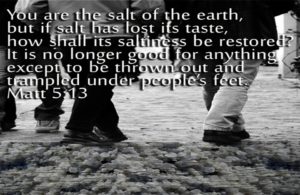[Greek] μωραίνω (mōrainō), [Latin] sal, [Latin] stultus: to become foolish (a moron), to become tasteless, to become insipid, to act as a simpleton, to make foolish; Rom.1:22, Mt.5:13, Mt.5:22, 1Cor.1:18, 1Cor.1:20

Useless and tainted salt thrown on roads to absorb moisture
Background Information:
Classical Greece: This term can take on different contexts. This can mean insipid or insufficiently seasoned foods. This term is found in the medical arena with slackness, fatigue, and dulling of the nerves. This term may be attributed to a failure in judgment or a deficiency of intellectual or spiritual capacities. This idea of folly may take on the nature of warning or the impossibility of understanding or following the thinking of others. This idea may be a condemnation of one’s character. Folly may take on a power which confuses one’s understanding, causing one to do mad things or taking a wrong path. Folly comes to expression as arrogance against the unfortunate. Folly may be seen as a fate.
Old Testament: Folly is seen as having a lack (intentional or unintentional) of the knowledge of God. This is seen as having eyes that do not see or ears that do not hear. This folly can be sometimes condemned as apostasy from God. Evil and corrupt leaders/rulers are often perceived as fools. Devotion to idols is seen as foolish. Warning against fools is a rule of life which runs through the wisdom of Sirach.
New Testament: Salt is used as a metaphor in how something becomes inactive or useless. The Gospel is incorruptible or indestructible as salt. This salt must not be inactive, useless or “tasteless”. Jesus refers to this salt as the disciples’ abilities to spread the Gospel. This salts loses its “taste” when the disciples’ faith vacillates and falls away. The disciples and followers of Jesus are the salt of the earth. Jesus speaks of the effectiveness and desire to preach the gospel. Salt was used in a variety of different ways. Salt was an important trading commodity. Salt was used in preserving foods, enhancing food flavor, and cleaning wounds. Salt was used to plug roof leaks. Useless and tainted salt even had its use. The worthless salt still had value as it absorbed moisture. This worthless salt was used for roads in the Roman Empire.
Scripture:
“You are the salt of the earth. But if salt loses its taste, with what can it be seasoned? It is no longer good for anything but to be thrown out and trampled underfoot.”Mt.5:13
This salt’s “flavor” is the disciples’ desire and enthusiasm to spread the Gospel. The disciple who wavers in his faith loses his value (“saltiness”). It also interesting to note that Jesus may be alluding to the salt on the roads. Jesus was telling His disciples to be “salty.”
“But I say to you, whoever is angry with his brother will be liable to judgment, and whoever says to his brother, ‘Raqa,’ will be answerable to the Sanhedrin, and whoever says, ‘You fool,’ will be liable to fiery Gehenna.” Mt. 5:22
Raqa is an Aramaic word for imbecile. Insulting or accusing someone as a fool may lead to condemnation and serious spiritual consequences. To call someone a fool would be to deny that person fellowship with God and man.
“The message of the cross is foolishness to those who are perishing, but to us who are being saved it is the power of God.” 1Cor1:18
Paul illustrates the conflicting values between the Greeks and the followers of Christ. Paul knew the Greeks would mock his message. That Paul would speak of a crucified man would seem very tactless to the Greeks. The Greeks think it is folly and in bad taste to talk about the crucifixion in the company of worthy citizens.
“Where is the wise one? Where is the scribe? Where is the debater of this age? Has not God made the wisdom of the world foolish?” 1Cor.1:20
The focus is on the content of wisdom and nonsense. The people of the world thought what they understood was wise, but God showed them that their way of thinking was foolish.
Conclusion:
Moron, moronic, salt, stultify
At first glance, I would have never thought that there would be a connection between salt and being foolish. However, I can see how this could be possible. Salt losing its tastiness is like someone not being too smart (losing their thinking capabilities). Both become useless. So disciples “worth their salt” are the ones who are effective in spreading the gospel.
To be worth one’s salt is to be worth one’s pay. The Latin salarium means salary. Sal is the Latin word for salt. Most scholars say that it was the money allowed to Roman soldiers for the purchase of salt.
